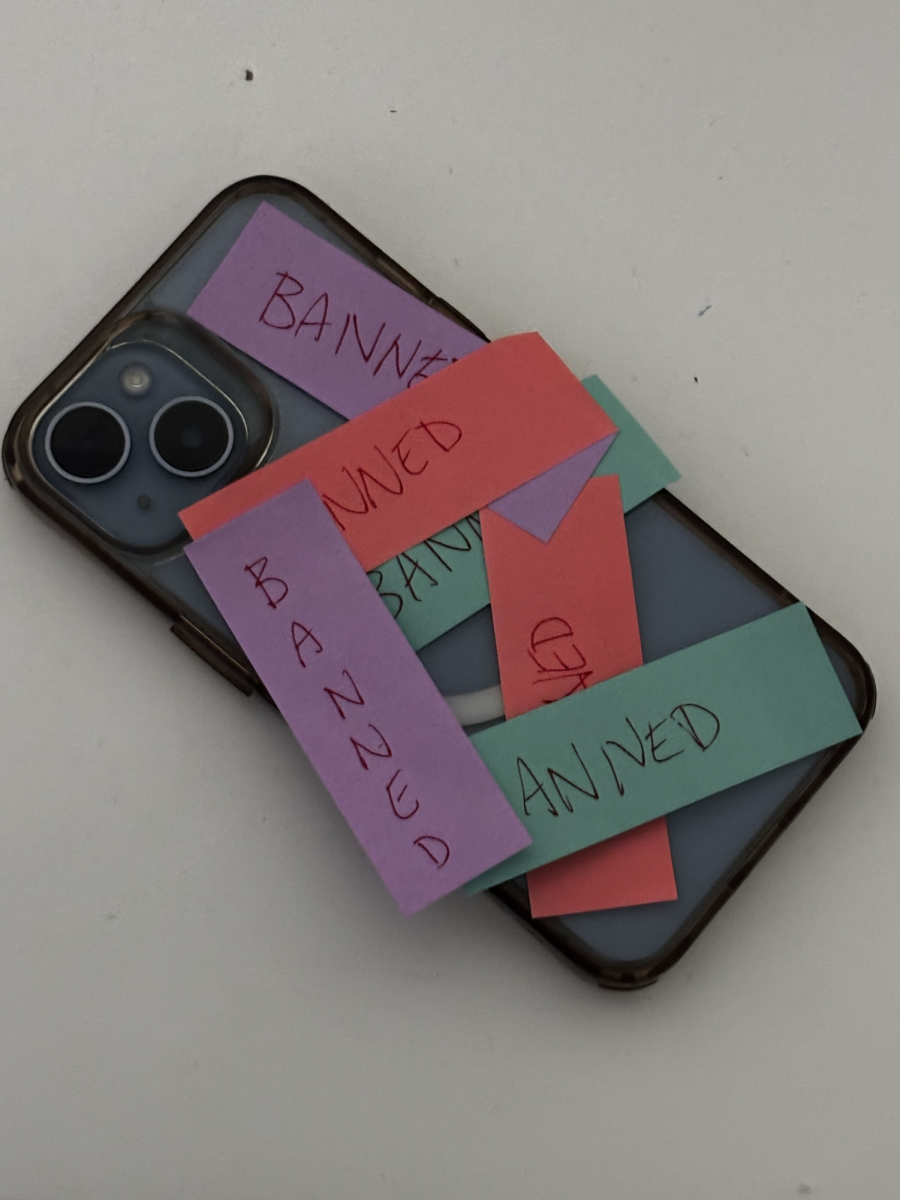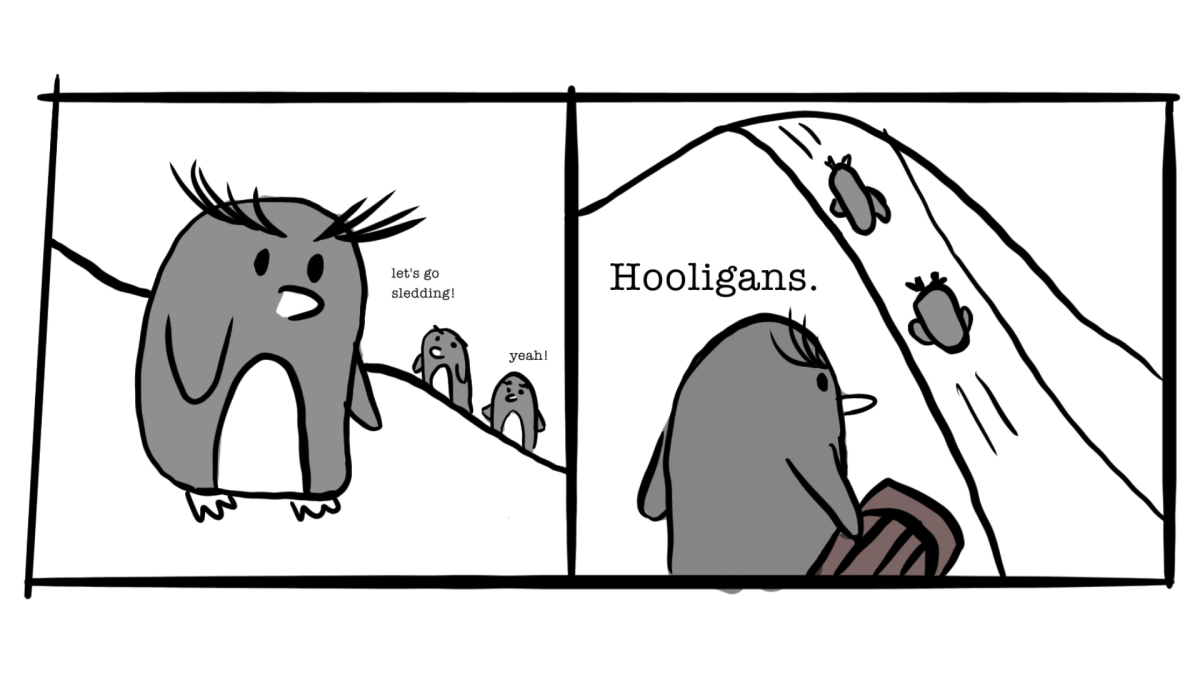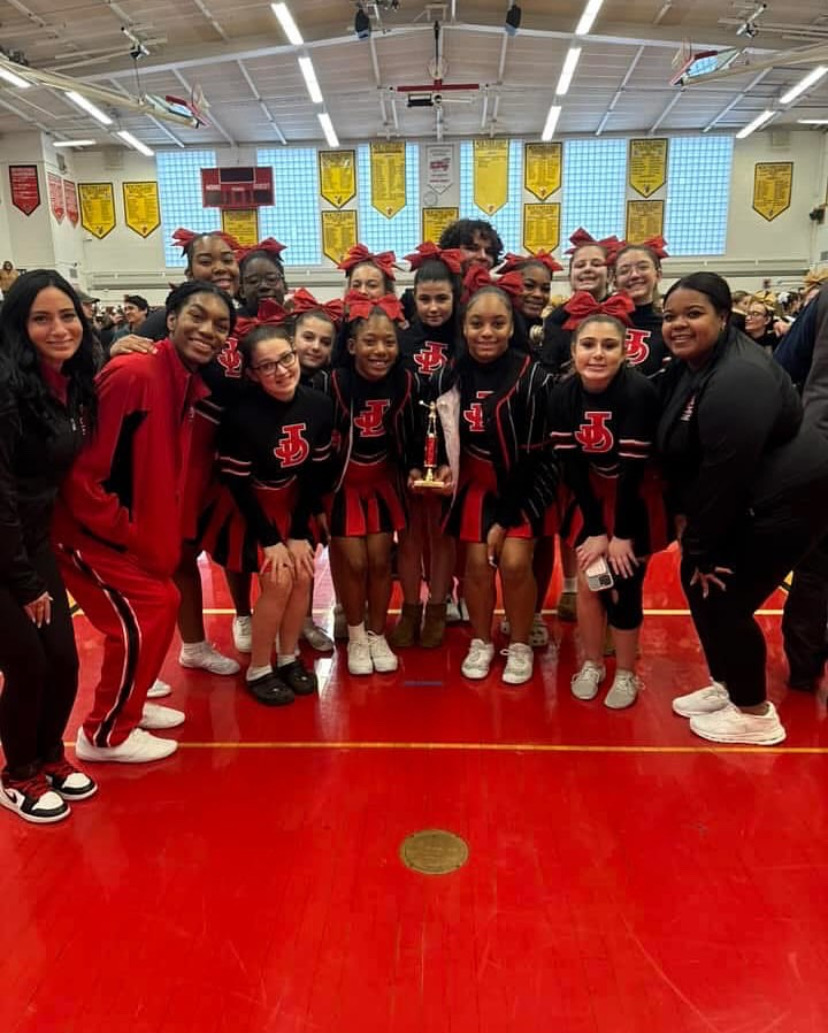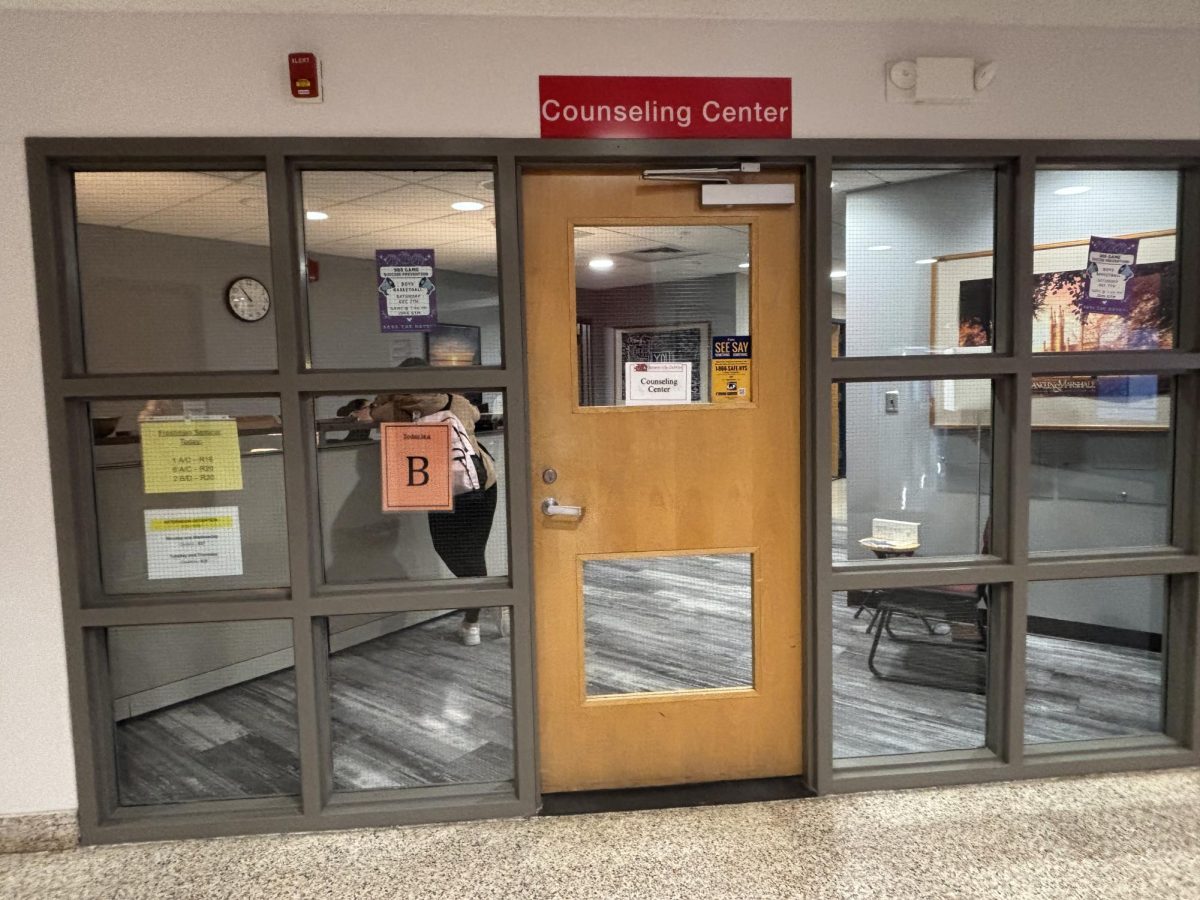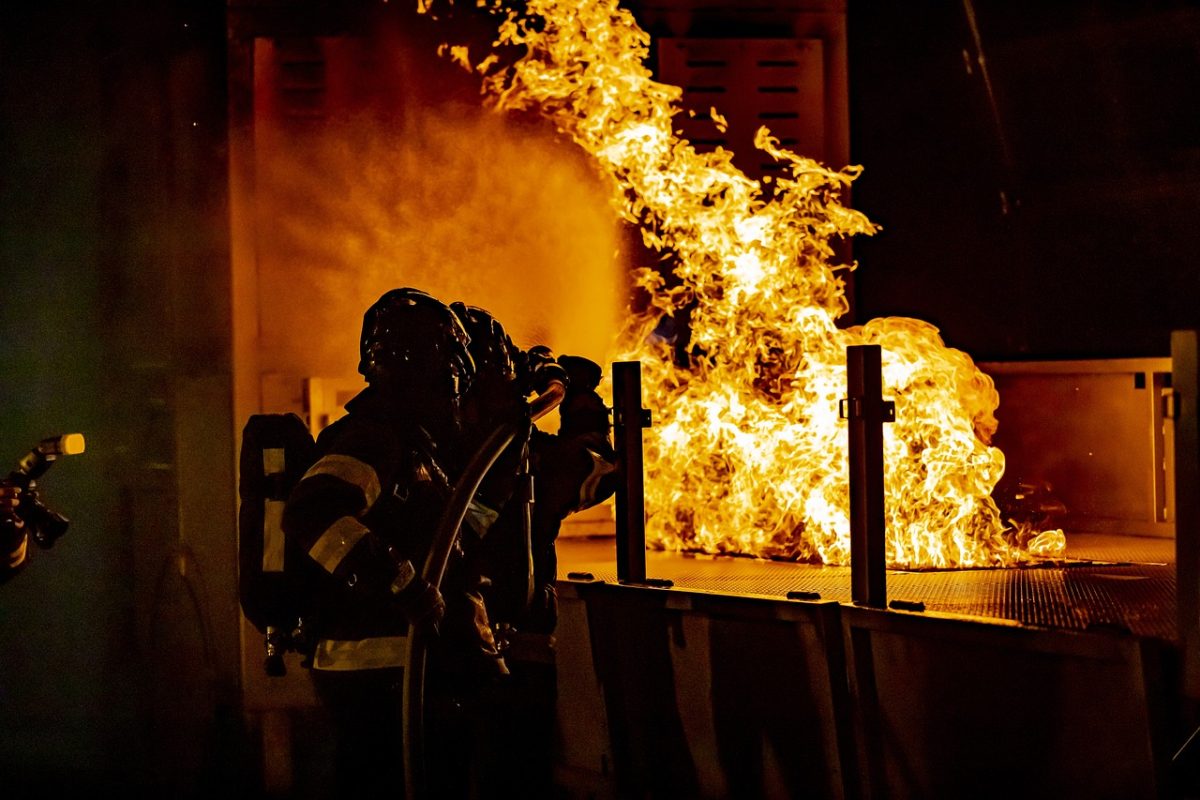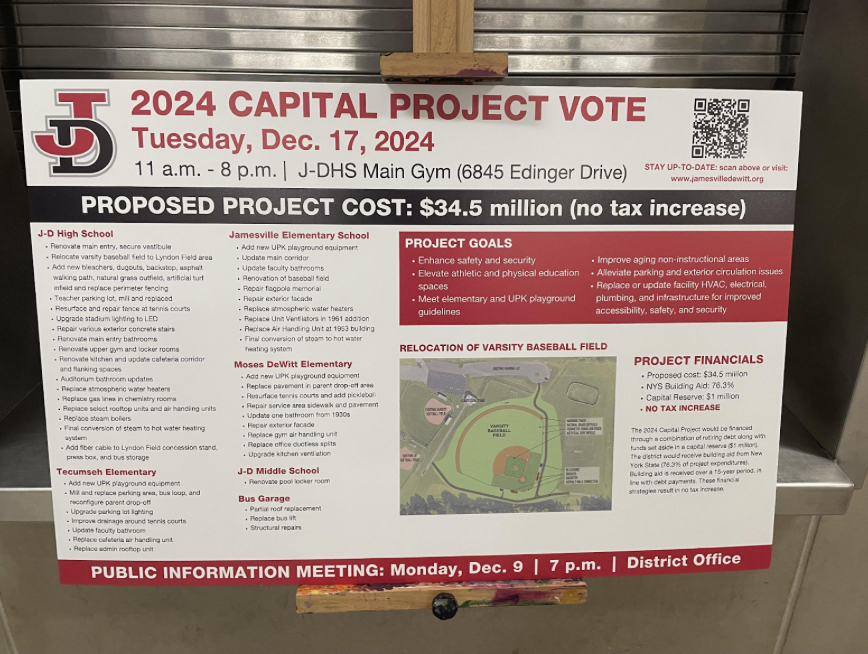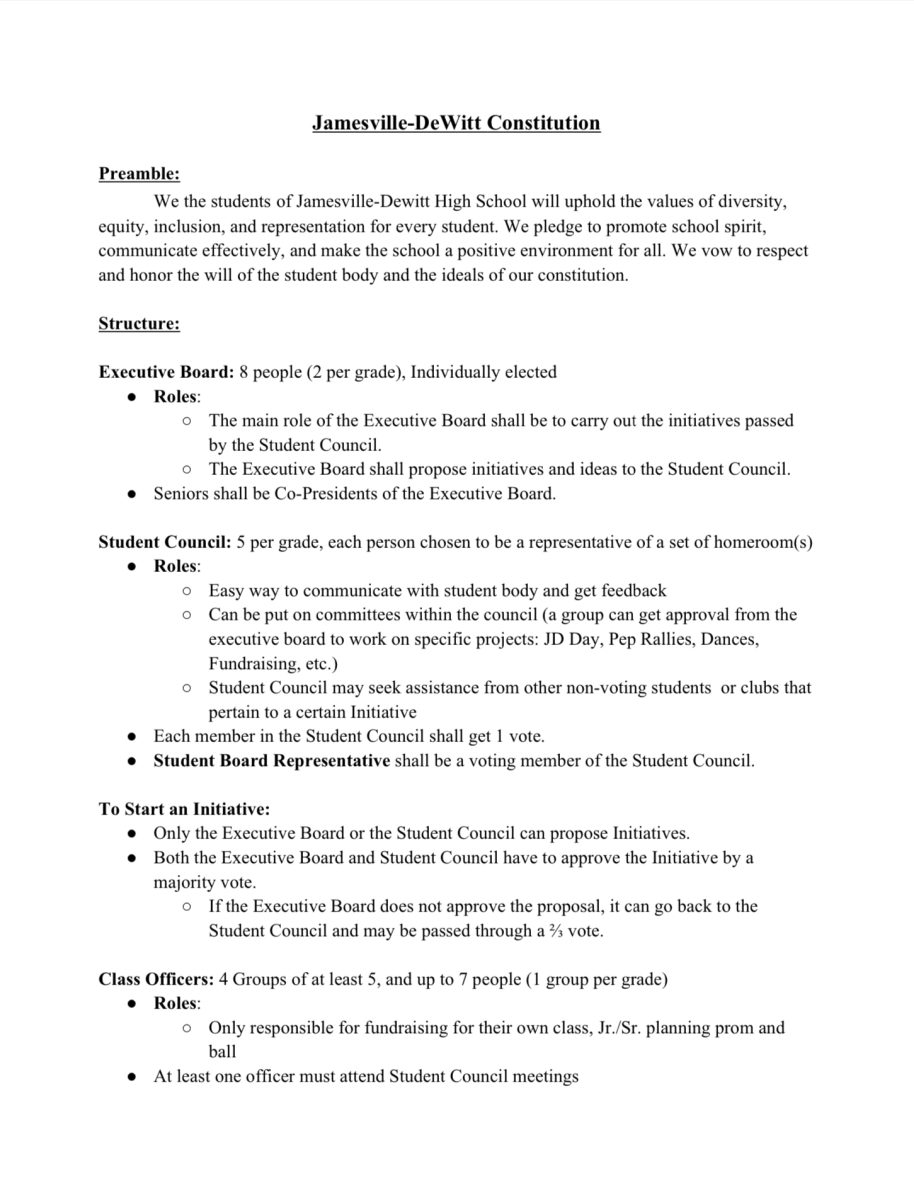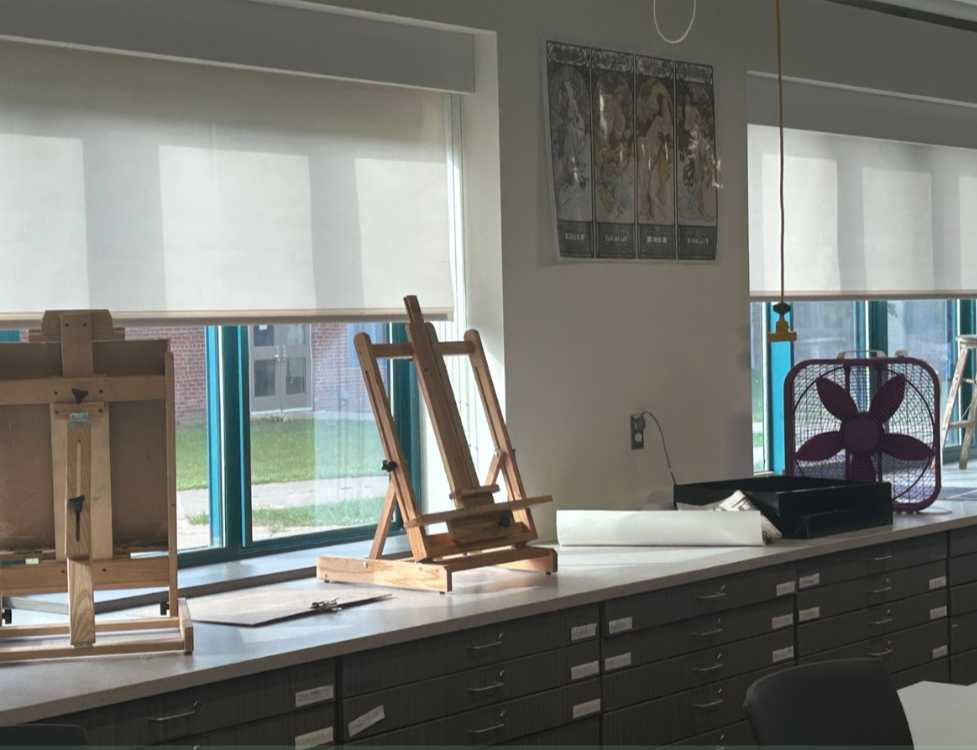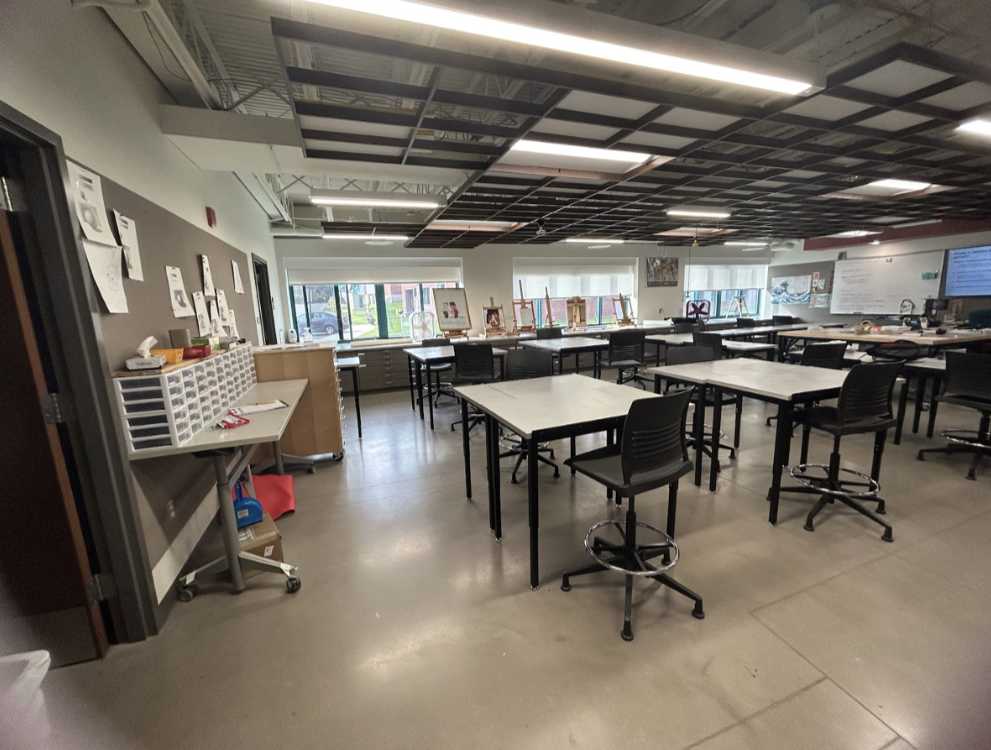Starting far earlier this year, Jamesville-DeWitt High School students are being asked to consider what electives they would like to take for the 2025-2026 school year. The available electives can be found on the official Jamesville-DeWitt district website but they will also be listed below.
AP classes are hosted by CollegeBoard. The classes culminate in a final exam in May with there being an exam fee of $103. Students typically receive their exam results in July or August, with their results being scored from 1-5. 3-5 counts as passing and based on the score, some colleges will accept it instead of forcing students to retake the class.
Syracuse University Project Advance (SUPA) classes are hosted by Syracuse University. There is a fee to complete the class, with there being financial aid available. A semester of a SUPA class will earn a student 3 college credits. Students should check on their own to make sure that their individual colleges will accept the credits.
The pre-engineering program follows the Project Lead the Way (PLTW) curriculum. Students who successfully complete the course may apply for college credits through Rochester Institute of Technology (RIT).
Each elective is listed a description of what the class will involve, pulled directly from the 2023-2024 course handbook. To look at the elective options by subject, click here:
– English
– Science
– Math
– Music
English:
Journalism 1: Foundations – Half year
Journalism 1 is the foundation of the media sequence in the English department. This unit will be the introduction to the skills, ethics and knowledge students will need to carry them through the rest of the sequence (Journalism 2 and Broadcast Journalism). Students will write JD’s student newspaper, RamPage. Students will investigate the following questions: What is the purpose of news? What is the difference between news and opinion? Why is it important to be critical consumers of news? This class helps reinforce the skills of the writers. As this is an English Department elective, one that is open to Freshmen, it mainly benefits students as an opportunity to work on their writing through vigorous and robust practical practice.
Journalism 2: 21st Century Publication – Half year
Prerequisite: Journalism 1
Students in the Journalism 2 elective course develop essential skills for media publishing. Focused units on graphic design, layout, web development, photography, and videography employ industry-standard technology to prepare students for publishing opportunities with the RamPage school newspaper, the RamFeed news broadcast, Rambunctious literary magazine, the Hilltop Echoes yearbook, and other publications both in and out of school. Students will create stories for both RamPage and Ramfeed.
Advanced Journalism – Half year
Requirement: Sophomore, Junior, or Senior standing
Prerequisite: Jounalism 1 & 2 OR RamPage/Rambunctious advisor permission
This is an English elective course for Sophomores, Juniors, and Seniors who have successfully completed both introductory journalism courses and wish to pursue the discipline beyond its basics. This is also available to experiential editors and staff members of RamPage and Rambunctious with advisor permission. Students work independently and in small groups to explore advanced topics in writing, publishing, technology, media, marketing, and management in support of school and independent publications. Assessment is portfolio-based.
Broadcast Journalism – Full year
Requirement: Sophomore, Junior, or Senior standing
This is an English elective course for students interested in the field of broadcast media, and who have completed one year of high school. We will be exploring the different genres associated with television, broadcast journalism, and film throughout the course of the year. During this course students will be responsible for creating and posting video news and features for the RamFeed. Also, throughout this course we will study other issues related to media, such as persuasion, perspective, power, etc. Broadcast Journalism will develop public speaking skills, a personal brand and an awareness of how to navigate the realm of social media.
Public Speaking – Half year
The primary goal of this course is to develop the oral communication skills needed in almost any career or school situation. Students will learn to prepare, organize, and present speeches for both formal and informal situations. In addition, they will learn to develop critical listening skills.
Creative Writing – Half year
Many students miss having time to write. Between their studies, extracurricular activities, work and other obligations, there just seems to be no time. Creative Writing class gives students back that time. This course allows students to improve their creative writing skills through consistent, monitored practice, peer response and teacher conferences. The majority of each class is devoted to focus on individual writing. While a number of short lessons in various genres, forms, and techniques are offered, each student negotiates his or her own writing objectives with the teacher.
Advanced Creative Writing – Half year
Prerequisite: 1 semester of Creative Writing
Students who have completed a semester of Creative Writing are eligible to enroll in Advanced Creative Writing. While advancing and refining their own writing craft, students will also open their work to thoughtful, helpful, and constructive critiques within the class. Reading as a key component of writing practice is also emphasized as students will keep a writer’s reading log, looking closely at the style and craft of writers they admire.
Reading Films 1 – Half year
Requirement: Parental permission is required for this course as “R”-rated films are included in the viewing list.
This course is a genre-based approach to studying film as the primary text. The focus is on identifying the conventions of each genre (Gangster, Horror, Drama, Animated, War, etc.) and analyzing cinematic techniques and the meaning they create. Class time is primarily spent on screening films and seminar-style class discussions.
Reading Films 2 – Half year
Requirement: Parental permission is required for this course as “R”-rated films are included in the viewing list.
Prerequisite: Reading Films 1
This course examines the filmography of influential film directors, such as Hitchcock, Scorsese, Eastwood, Lee, Bigelow, and others. Utilizing an understanding of basic cinematic techniques learned in Reading Films 1, students analyze how the director employs them to create meaning and develop her personal creative vision. The signature style of each director is identified and analyzed to appreciate how she might qualify as the “author” of her own artwork under auteur theory. Class time is primarily spent on screening films and seminar-style class discussions.
Advanced Reading Films – Half year
Requirement: Parental permission is required for this course as “R”-rated films are included in the viewing list.
Prerequisite: Reading Films 1 & 2
Building on genre, auteur, and cinematic concepts from Reading Films I & II, films are analyzed through various critical lenses, including archetypal, feminist, Marxist, historical, and psychoanalytical theory, to peel back the layers of meaning in a rich film text. Class time is primarily spent on screening films and seminar-style class discussions.
Pop Culture Text and Psychology – Half year
This course applies the work of Freud, Lacan, Klein, Jung, Adler, Ainsworth, and other influential scholars of psychology to popular cultural stories (print, TV, film, comics, graphic novels, etc.). Topics may include, but not be limited to, dreams, the conscious and subconscious minds, the ID, ego, and superego, defense mechanisms, the collective unconscious, memory, behaviors, psychological complexes and disorders, PTSD and identity construction. These concepts will be applied to the conflicts, characters, and composers of pop culture stories, such as Harry Potter, Batman, The Big Bang Theory, Dexter, and beyond.
Corporate Communications – Half year
Requirement: Junior or senior standing
Explore various aspects of the business world, including leadership and management styles, in this half-credit elective by analyzing corporations and their culture with written formats such as memos, business plans, and proposals. Both individual projects and team projects allow you to practice the types of reading, writing, and speaking that will someday help you get a job, no matter what field you are interested in entering. The course includes project-based learning, life skills, and real-world applications with assignments including resumes, cover letters, and mock-interviews.
Social Studies:
AP European History – Full year
Requirement: Junior or Senior standing
This course is open to Juniors and Seniors and focuses on the in-depth study of European History, with an emphasis not only on the significant individuals and events of that history but also on the environmental and technological factors that helped shape it. A major goal of the course is to enable students to better understand how our own societal values including our commitment to personal liberty, constitutional government, capitalism, free inquiry, rationalism and the rule of law have their origins in European History.
Psychology – Half year
Requirement: 10th, 11th, and 12th graders
This course will focus on building a better understanding of human behavior. Students will learn about themes such as motivation, personality styles, and how we develop over the course of our lives. Students will also learn about abnormal behavior, mental wellness, and even how psychology applies to various careers. This course is appropriate for anyone interested in an introduction to the field of psychology.
SUPA Psychology – Half year
Requirement: 11th and 12th graders
This course is designed to expose students to college-level material in the study of psychology. Major topics include psychology as a behavioral science, physiological psychology, personality, abnormal psychology, child development and social psychology.
Sport Psychology – Half year
Requirement: 10th, 11th, and 12th graders
Sport Psychology will focus on understanding how psychology influences participation in sports- or ANYTHING that requires performance. Students will learn about the history of sport psychology, personality styles, coping with anxiety/stress, self-confidence, motivation, leadership, goal-setting, group dynamics, psychology of injury, and mental wellness. Students can apply this learning to their own performances on the field, in the pool, on the court, on the ice, or ANY Setting that requires performance under pressure. This course is appropriate for: current student-athletes, students interested in a career as a coach, and students interested in psychology.
Practical Law – Half year
Requirement: 10th, 11th, and 12th graders
This course is both a course in practical law and an issue-oriented course with materials designed to provoke intensive classroom discussion and debate. In addition, a major purpose of this course is to give those who study it some knowledge of law that can be of practical use to them in their everyday lives. Among the topics surveyed in this course are criminal law, family law, housing law, individual rights law, and tort law. Guest speakers and field trips are included in this course.
Film Heritage – Half year
Requirement: The subject matter includes unrated and rated films, including films with an R-rating. As a result, permission from a parent and/or guardian is required upon student enrollment in the course.
The Film Heritage course is designed to guide students through the process of analyzing films as works of art. The course explores how serious themes such as the ravages of war, the dehumanization of violence, and human relationships are dealt with through a visual medium. How the visual medium of film depicts such themes reflects a great deal about a culture in a particular moment of history. The course also uses film to explore the social and cultural context of the period in which it was made. The course includes discussion, historical and critical analysis, and written assignments.
U.S. Military History I – Half year
This course involves a look at national and world history with a special emphasis on U.S. participation in the wars of the 20th century. Topics covered include the political and economic factors that influenced the decision to go to war; military weaponry and doctrine; social and cultural implications; significant air, sea and land campaigns; the aftermath and consequences of the war; and perspectives on the meaning and place these conflicts have in our history.
U.S. Military History I will look at World War I and World War II and an overview of the U.S. Military structure.
U.S. Military History: Civil War – Half year
This course involves a look at national and world history with a special emphasis on U.S. participation in the wars of the 20th century. Topics covered include the political and economic factors that influenced the decision to go to war; military weaponry and doctrine; social and cultural implications; significant air, sea and land campaigns; the aftermath and consequences of the war; and perspectives on the meaning and place these conflicts have in our history.
U.S. Military History II will look at the issues of the Cold War and our involvement in Korea and Vietnam.
Current Events Studies – Half year
What will be in the news? The economy? The new President? Terror attacks? The Phillies? Our course outline will depend on what is happening at the time. Students will get daily newspapers and have access to news magazines, TV coverage and the internet. Students will share stories of interest to them, opinions and observations regarding the various sources of news. Students will keep a news journal and complete various projects.
American Women in History – Half year
American Women in History is a women’s studies course that will look at the contributions of U.S. women and their struggle for full inclusion. The course will include the significant people, accomplishments and challenges of women in the many areas of American society. Through articles, films, important documents, and speakers students will develop an understanding and appreciation of the many contributions of women to the history and culture of our country.
Science:
AP Biology – Full year
Requirements: Junior or Senior standing.
Prerequisite: Biology Honors
This course is open to Juniors or Seniors that have an exceptional work ethic, have performed well in Honors Biology, and who may have an interest in pursuing a possible biology-related field in college. Overall, the course curriculum will parallel an introductory college level biology course. Topics will include molecules and cells, genetics and evolution, and organisms and populations. This accelerated survey of biology will cover all of the topics required by the College Board in order to prepare students for the AP Exam. In addition, students will also complete the recommended AP Biology laboratory experiments. After the AP Exam, students will spend the remainder of the year working on special projects.
Two class blocks per four-day cycle will be scheduled for these students.
AP Chemistry – Full year
Requirement: Senior standing
Prerequisite: Chemistry Honors
This course is open to Seniors that have done well in science and math and are willing to put forth extra time and effort and are planning to pursue a science-related field in college. The course curriculum will include the following topics taught at the pace of a first year college-level chemistry course: stoichiometry, periodicity, chemical bonding, thermochemistry, kinetics, equilibrium, acid and bases, redox and organic chemistry. The course will include laboratories that are recommended by the College Board to prepare students for the AP exam. After the AP exam, students will spend the remainder of the year working on special projects.
Two class blocks per four-day cycle will be scheduled for these students.
Introduction to Environmental Science – Half year
Prequisite: Successful completion of Biology course.
This course is a hands-on introduction to the study of the environment, how humanity has impacted it, and what we can do to repair and protect it. Students need to have successfully passed the Regents Biology exam to be eligible for this course.
Advanced Environmental Science: SUNY ESF – Full year
Prerequisite: Successful completion of Regents Chemistry Exam
This course starts with an in-depth examination of various types of renewable sources of energy. Emphasis is placed on synthesizing connections among different energy sources, challenges, and benefits among them. The course continues with a survey of aspects including population and demographics; agriculture and toxic substances; water resources and pollution; and climate change. Independent research projects on environmental science topic is required.
Anatomy and Physiology I – Half year
Prequisite: Completed or concurrent with Regents Biology
This course is not a prerequisite for the Anatomy & Physiology II course. This course is for students that want to broaden their knowledge of the human body with a specific emphasis on the skeletal, muscular, nervous and endocrine systems. It is extremely beneficial to those students who may be interested in planning a career in the health sciences. Among other laboratory activities, students can expect to carry out at least one animal dissection in the class. Most work is self-directed, so students taking this course need to be motivated and responsible in order to be successful.
Anatomy and Physiology II – Half year
Prerequisite: Completed or concurrent with Regents Biology
Students do not need to have taken the Anatomy & Physiology I course in order to take this class. This course is for students that want to broaden their knowledge of the human body with a specific emphasis on the circulatory, respiratory, digestive and excretory systems. It is extremely beneficial to those students who may be interested in a career in the health sciences. Among other laboratory activities, students can expect to carry out at least one animal dissection in the class. Most of the work is self-directed so students taking this course need to be motivated and responsible in order to be successful.
Forensic Science – Half year
Prerequisite: Completed or concurrent with Chemistry (Any level)
Forensic science is focused on the application of scientific methods and techniques to crimes and law. Recent advances in scientific methods have had an enormous impact upon law enforcement and the entire criminal justice system. In this elective, scientific methods specifically relevant to crime detection and analysis will be presented. Emphasis will be placed on understanding the science behind the techniques used in evaluating physical evidence. Several laboratory exercises will be included to demonstrate techniques commonly employed in forensic investigations.
Forensic topics will include:
● DNA analysis ● Physical properties ● Tool marks and impressions ● Arson and explosives ● Hair and fiber analysis ● Firearms ● Fingerprints ● Chromatography ● Pathology ● Toxicology
SUPA Forensics – Full year
Requirements: Junior or Senior standing
Prerequisite: Completed or concurrent with Regents Chemistry
This course is focused upon the application of scientific methods and techniques to crime and law. Scientific methods specifically relevant to crime detection and analysis will be presented with emphasis placed upon the techniques used in evaluating physical evidence. Topics include blood analysis, organic and inorganic evidence analysis, microscopic investigations, hair analysis, DNA, drug chemistry and toxicology, fiber comparisons, paints, glass compositions and fragmentation, fingerprints, soil comparisons, and arson investigations. Laboratory exercises will include techniques commonly employed in forensic investigations.
Two class blocks per four-day cycle will be scheduled for these students.
Astronomy – Half year
This course is intended for students who have taken Earth Science. Students in this class will investigate the motion of the objects in our solar system more thoroughly. They will receive an introduction to Electromagnetic Radiation and the ways that light can be collected and interpreted to help us better understand the universe. Students will get an introduction to physics as they learn about the formation of stars, galaxies, and black holes.
Mathematics:
AP Statistics – Full year
Prerequisite: Algebra 2 Regents/Honors
This course focuses on the exploration of statistical concepts and problems that are at the core of the Advanced Placement Statistics curriculum (exploring data, sampling and experimentation, anticipating patterns, statistical inference). Throughout the course, students will take part in hands-on investigations of statistical data and models. Students will also receive instruction in the statistical applications of various forms of technology including, but not limited to, graphing calculators and applets. To be successful in this course, students must have a solid mathematical background along with strong writing, reading, and analytical skills.
Financial Algebra
Prerequisite: Algrebra 1
This is a new course that Jamesville-DeWitt is offering. There is not a written description of the course available yet.
Intro to Computer Science – Half year
Students will learn how to design and code computer applications. Example coding projects include video games, smartphone apps, controlling virtual robots, text-based programs, and webpages. Some of the programming languages used are Scratch, Java, and HTML. Intro to Computer Science is project-based, meaning no tests or quizzes. This course assumes a strong math background. No previous programming experience is required or expected.
Studio Computer Science – Half year
Prerequisite: Intro to Computer Science OR AP Computer Science: JAVA OR AP Computer Science Principles
Students will design and implement computer-based projects of their choice. Industry-accepted software engineering practices, such as design and testing, will be taught and used. Students will be expected to complete 1-2 projects per marking period. Any programming language, development environment, or hardware may be used to fit project goals. Time will be given to learn new languages or technologies, if needed. Example projects include video games, artificial intelligence, simulations, machine learning, smartphone apps, Raspberry Pi, and code-controlled robots. This course is meant to give time and creative freedom for students to complete larger-scale coding projects that are not possible in other computer science courses.
AP Computer Science Principles (APSCP) – Full year
Prerequisite: Strong math background AND completed Algebra 1 Regents
AP Computer Science Principles offers a multidisciplinary approach to teaching the underlying principles of computation. The course will introduce students to the creative aspects of programming, abstractions, algorithms, large data sets, the Internet, cybersecurity concerns, and computing impacts. AP Computer Science Principles will give students the opportunity to use technology to address real world problems and build relevant solutions.
AP Computer Science (APCS): JAVA – Full year
Prerequisite: Intro to Computer Science OR AP Computer Science Principles OR Instructor’s Permission
AP Computer Science Java teaches object-oriented programming using the Java language and is meant to be the equivalent of a first semester, college-level course in computer science. It will emphasize problem solving and algorithm development, and use hands-on experiences and examples so that students can apply programming tools and solve complex problems. Case studies will be used throughout the course to expose students to programs written by more experienced programmers and to put the concepts studied into context. This course assumes some previous experience in coding, whether it be a Computer Science course at J-D or some other comparable experience.
Music:
Concert Band – Full year
Requirements: Participation in lessons, rehearsals, and concerts is a requirement of the course.
This course is an ensemble made up of woodwind, brass, and percussion players. Lessons are a requirement for this course and will be conducted on a rotating, pull-out basis. The Concert Band focuses on developing music reading and instrumental technique through the performance of numerous styles of music, including: classical, pops, jazz, and contemporary. Members of Concert Band will have the opportunity to perform with the Orchestra as well through participation in mandatory rehearsals scheduled during the activity period. Participation in all evening concerts is a requirement of the course. This course fulfills the graduation requirement for music/art.
String Orchestra – Full year
Requirements: Participation in lessons, rehearsals, and concerts is a requirement of the course.
This course is an ensemble made up of violin, viola, cello, and bass players. Lessons are a requirement for this course and will be conducted on a rotating, pull-out basis. The String Orchestra focuses on developing music reading and instrumental technique through the performance of numerous styles of music, including: classical, baroque, pops, and contemporary. Members will be required to attend 2-3 scheduled activity period rehearsals for each concert in order to collaborate with band members in performing full orchestra literature. This course fulfills the graduation requirement for music/art.
Concert Chorale – Full year
Requirements: Requirements for membership include: 1. ability to match pitch, 2. consistent and on-time attendance at all rehearsals and concerts, 3. careful maintenance of all music and materials, 4. a willingness to learn.
Concert Chorale provides students in grades 9-12 an opportunity to sing all styles of music (classical, jazz, musical theater, and popular) written for four-part, mixed chorus.
Concert Chorale Honors – Full year
Requirements: Same as those for Concert Chorale with the added requirements: participation in In Achord, the musical, All-County Chorus, Area All-State, NYSSMA, All-State, OR participation in a small ensemble directed by the choral director.
Chorale at the Honors level provides selected singers in grades 9-12 with the opportunity to sing all styles of music (classical, popular and jazz).
Music Theory 1 – Half year
Requirements: Membership in any of the performing musical groups offered by the school, or at least two (2) years of private instruction offering basic musical knowledge in vocal or instrumental music.
Music Theory 1 is the study of basic musical forms and structures. Elements of music construction are studied and skills in music reading, sight singing and aural instruction are developed.
Music Theory 2 – Half year
Prerequisites: Students must have a C or above in Music Theory 1 to enroll in Music Theory 2.
Music Theory 2 is a continuation of the concepts from Music Theory 1. Students will focus on tonal harmony, both in writing and
analysis.
Voice Class – Half year
This course offers an introduction to the fundamentals of singing for beginners and the furthering of vocal technique for more experienced singers. In the course, many styles of solo literature are studied: Broadway, Classical, Jazz and Pop solos are included in the repertoire.
Technology:
PLTW: Design & Draw for Production – Full year
Corequisite: Concurrent enrollment in Math
DDP/IED provides an opportunity to be creative and to apply decision-making and problem-solving skills to design problems. Students will use powerful computer hardware and software Fusion 360 to develop 3-D models. Students will learn the product design process through creating, analyzing, rendering and producing a model. This course follows the New York State syllabus for Design and Drawing for Production.
PLTW: Computer Integ. Mfg. – Full year
Prerequisite: DDP/IED
Corequisite: Concurrent enrollment in Math
CIM is a course that applies principles of prototyping, robotics, and automation. It builds on the solid modeling skills developed in Introduction to Engineering Design. Students will use computer-controlled equipment to solve problems by constructing models of their three-dimensional designs. Students will also be introduced to the fundamentals of robotics and to how this equipment is used in an automated environment. Design will be evaluated using various techniques and modifications before the prototype is produced.
PLTW: Engineering Design/Development
Requirement: 12th Grader
Prerequisite: DDP/IED, POE, CIM
Corequisite: Concurrent enrollment in Senior level Math
In this course, students work on a team with one or two others to design and construct the solution to an engineering problem. The problems will involve a wide range of engineering applications (e.g., a school robo-mascot, automated solar water heater and remote control hovercraft). Students apply the principles developed in previous courses. A journal will become part of a portfolio. Each team will be responsible for delivering reports and making final presentations to an outside review panel.
PLTW: Principles of Engineering – Full year
Requirement: 11th and 12th graders
Corequisite: Concurrent enrollment in Math
POE is designed to help students understand the field and career possibilities of engineering and engineering technology. Students work on the problem-solving skills that are used at the college level and in the workplace, and engineering systems and manufacturing processes are explored. Students will also learn how engineers address concerns about social and political consequences of technological change.
Architectural Design – Half year
A project-based course that introduces students to the basic fundamentals and principles involved with drawing and designing different forms of buildings. Students will learn how to create and render their own designs on both paper and the computer. This course will also include interior design elements such as room layout and furniture.
Architectural Modeling – Half year
Prerequisite: Architectural Design
A hands-on project-based course that will introduce students to the basics of construction and scale modeling. Students will work to create 3D structures based on plans they receive. Residential planning, building codes and specifications will also be discussed. The overall goal of this course is to help students develop an understanding of building based on design blueprints.
Graphic Design & Editing – Half year
A fun and creative course that uses a variety of website- and software-based tools such as PIXLR, Adobe Photoshop, and Adobe Illustrator. Throughout the course, students will work to develop their computer-based skills to create graphics that solve specific problems. Some of the course projects will include: a digital portfolio, desktop/phone background, Photoshop competitions, typography, and a website. The overall goal of this course is to give students the tools they need to create professional-looking graphic designs through engaging and meaningful practice
Graphic Design for Production – Half year
Introduce students to software and hardware that is used to publish and produce physical forms of graphics. Throughout the course, students will be designing graphics for tangible objects. Some of the course projects will include: packaging designs, cards, stickers, coloring books, and a t-shirt. The overall goal of this course is to develop an understanding of how graphics are designed and used in the physical world.
Media Production 1 – Half year
In Media Production I students will participate as members of a production team that will be responsible for the creation of digital video and audio productions. A student will express ideas in a technical format capable of utilizing graphic and electronic media equipment. This will be accomplished with the aid of a state of the art production facility consisting of studio lighting, Macintosh computers, digital camcorders, and Apple iMovie software.
Assignments to be covered include: a biographical sketch, video storyboarding, filming of your favorite neighborhood, a television and radio commercial, a video collage and a final project of choice.
This is a course for students interested in learning how to create audio and video presentations from start to finish.
Media Production 2 – Half year
Prerequisite: Media Production 1
In Media Production II students build upon what they have learned from the Media Production 1 course. Each project will encompass the concepts learned from the Media Production I course, with students gaining a deeper knowledge of studio production, field shooting, audio/visual editing techniques, and compositional aspects.
Topics to be covered include: working with Final Cut Express, the industry standard in video editing software, controlling multiple audio & video tracks, chroma key techniques, recording with two or more cameras, layering techniques, and background imaging.
Assignments to be covered include: a television report, a short story, a television commercial, a multiple angle shoot, and two projects of choice. The content of each project will be designed by the student and approved by the instructor.
Students will explore college and career opportunities coupled with field trips to local industries such as WSYR Channel 9.
Advanced Media Production – Half year
Prequisite: Media Production 1 & 2
Advanced Media Production is a course for a student who feels comfortable with the accomplishment of their two prior courses in this area and want to continue his/her study in the field of digital video and audio production.
Students are encouraged to work independently and experiment with specific topics of interest. An emphasis will be placed on the quality of the project including: originality of idea, storyboarding, compositional aspects, location of footage and the depth of editing.
Students enrolled in this course will work primarily with video digital equipment consisting of camcorders, the Macintosh computer and the editing software Final Cut Express
Creative Woodworking 1 or 2 – Half year
This course develops a personal satisfaction that comes from the design and development of attractive and useful individual wood projects. Students will work with power and hand tools that are similar to those used in industry. This is a course that emphasizes the concept of individual woodworking.
Advanced Woodworking – Half year
Prerequisite: Creative Woodworking 1 and Creative Woodworking 2
Advanced Woodworking is a hands-on laboratory course that encourages the student to achieve a high level of competency in the area of woodworking and design. Students are expected to demonstrate mastery level skills developed in the prerequisite courses Creative Wood 1 & 2. Each student is expected to design and construct a project to specifications. Students will also develop advanced blueprint reading skills and follow professionally drafted plans to construct a complex wood project of choice. An in depth study into the characteristics and properties of wood will be explored. Furthermore, students will explore career opportunities, and secondary schools offering programs of interest.
Yearbook Production – Full year
Requirement: Students must apply to be considered for the class. Advisors will determine class members based on applications.
The members of this class produce the annual Hilltop Echoes yearbook publication. The class incorporates all aspects of book publication including planning and implementation of page layout and design, photography, writing captions and articles, and proofing and editing. In addition, students will plan and implement the advertising, selling and distribution of books and recognition space. Students in this class will learn the basics of establishing an organizational plan, how to manage a business, journalism, and graphic design. Students must be responsible; self motivated, and have the ability to work both independently and cooperatively with fellow Hilltop Echo staff members.
Art:
Ceramics 1, 2, or Advanced – Half year
Studio in ceramics is a skill-based course in which students will explore the three-dimensional visual world using clay as a medium for creative self-expression. The initial step in the ceramic process, which fosters creativity, is a computer based research assignment. Students have the freedom to develop their ideas by collecting ceramic images of current and historic clay works to then be interpreted in sketchbook form. These divergent drawings will be utilized as a foundation for the building process.
The two primary building methods that students will explore are hand building and throwing on the potters’ wheel, in the pursuit of utilitarian and sculpturally based art forms. Both aspects of ceramic construction are based on step-by-step learning and the mastery of each step or stage. Clay has a unique, primary property of being a direct feedback material. This means that when a student makes a mistake, since the clay is malleable it can be changed or modified in the process of building. It is our goal to make the student self-aware of any mistakes that may have been made. Then make the necessary adjustments in the pursuit of good craftsmanship. Following the completion of the building process students will learn about firing and glazing. The end goal of the J-D ceramic program is for students to gain the experience and appreciation in the creation of a hand-made object, which is personal and self-expressive.
Studio Art 1 – 1st semester only
This is a one-semester introduction to studio arts practices and theories. Topics covered include drawing skills and strategies, the elements and principles of art and design, materials and techniques, art history, aesthetics, art criticism, and contemporary art trends.
Studio Art 2 – 2nd semester only
Prerequisite: Studio Art 1
This course is designed to expand upon and refine the skills learned in Studio in Art 1. The focus will be on training the eye and hand to see and render more accurately and with more subtlety. Drawing and painting media will be explored in greater depth, and students will begin to explore avenues of individual interest.
Advanced Studio Art – Half year
Prerequisite: This course is designed for students who have completed both Studio Art 1 & 2.
Students will continue to refine observational and technical skills through traditional art media. Students will begin to create a portfolio of work that is organized around a central conceptual theme or themes. Student art portfolios are an essential requirement for any college-level study in visual arts, including fine arts, graphic design, industrial design, architecture, animation, fashion design, etc. Students in this course are expected to be independently motivated. This course may be repeated throughout the student’s high school career.
Photography 1 – 1st semester only
Photography 1 is an introduction to black and white film photography. This class covers the mechanics and techniques of using a 35-mm SLR camera, film processing and printing. Both the technical and aesthetic aspects of black and white photography are taught, including developing an understanding of composition, subject matter, lighting and the art of seeing. The class begins with a review of the history of photography and progresses through basic exercises that help familiarize students with the concept of capturing and processing an image on paper and film. Subsequent assignments build upon previously taught concepts to strengthen and further develop shooting and printing skills. Class critiques are held to create a deeper awareness and understanding of a student’s own and other’s work.
Photography 2 – 2nd semester only
Prerequisite: Photography I
This course is an extension of Photography 1, and assignments are given to expand student knowledge and mastery of camera skills. Students are expected to be proficient in previously learned concepts and are held accountable for the quality of their work. More complex technical skills are introduced and students experiment with deviations from standard black and white printing. The majority of this class will be working digitally and using both phones and DSLR’s to capture images. Through a variety of exercises and assignments, students will learn basic editing techniques using Lightroom and Photoshop software.
Advanced Photography – Half year
Prerequisite: This course is designed for students who have completed both Photography 1 & 2.
Advanced students are given assignments to further develop their digital camera and photo editing skills. Assignments will introduce them to a variety of camera and Photoshop techniques. Technique and quality will be stressed, and students will have much more freedom in the choice of subject matter, the development of original ideas and the exploration of their specific interests. Students are encouraged to work more independently and experiment with their ideas. This class is designed for the student who loves photography, wants to improve their skills and is interested in expanding upon various concepts in unique ways.
Other
Capstone – Full year
Prerequisite: Statement of Interest
Are you a hands-on learner…an independent thinker…or someone who’s interested in issues that aren’t covered in existing electives? This multidisciplinary senior elective course is for those interested in developing a community-oriented research project centered on a self-selected topic. Students will collaborate with teacher-mentors and experts in the community, conduct research, and implement a rigorous culminating project that connects with the students’ interests, and contributes positively to the community. Final projects can use diverse approaches – artistic, scientific/technical, digital, action-oriented, programmatic, and more. These projects will be presented and assessed in a public forum. Throughout this year-long course, students will develop skills such as oral and written communication, public speaking, research, goal setting, critical thinking, and project planning, all essential in college and the 21st century workplace. Successful completion of the course may qualify students to earn The New York State Seal of Civic Readiness. Students interested in learning more about this opportunity should speak with their Social Studies Teacher.

